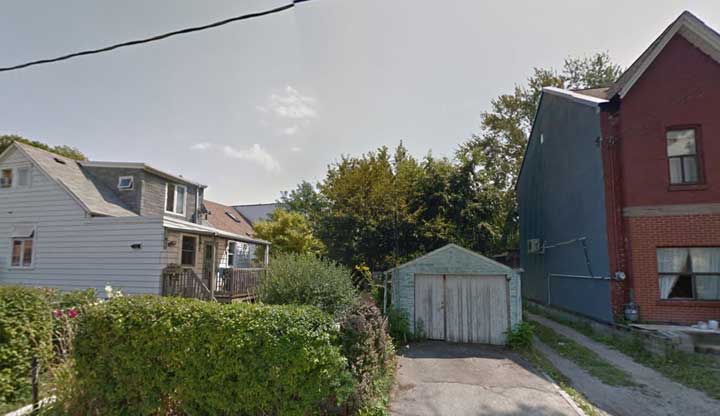One Toronto neighbourhood may be able to find some peace this holiday season after the Ontario Court of Appeal finally settled its property dispute — and along the way created some novel legal interpretation.
 The case, Gold v. Chronas, involves a fight over a reputed “laneway” that separates Brock Street and Cunningham Avenue in Toronto’s west end Parkdale community. The laneway — really just a strip of land — ran alongside a house on Cunningham, and was technically the property of the Cunningham homeowners.
The case, Gold v. Chronas, involves a fight over a reputed “laneway” that separates Brock Street and Cunningham Avenue in Toronto’s west end Parkdale community. The laneway — really just a strip of land — ran alongside a house on Cunningham, and was technically the property of the Cunningham homeowners.
The laneway, however, was being used by the owners of at least three homes sitting adjacent to the land on Brock Street. The Brock homes were situated near a rail overpass, so cars were unable to stop outside. Their only access to their homes was via the laneway.
This unfortunate example of poor city planning led to the nasty neighbour spat. In 2013, the Cunningham owners — having found no explicit right of way in their deed for at least 40 years (the statutory limit for title investigations) — decided that they were within their rights to block access. They erected a pole in the middle of the lane.
The Brock owners, left without access to their homes, applied for an injunction against the Cunningham owners. As it happened, the deeds for the Brock homes did refer to a right of way created prior to 1960, even though the stipulation had vanished from the Cunningham chain of title. The application was granted, leading eventually to last week’s showdown at the Court of Appeal.
On Friday, the homeowners on Brock Street secured their laneway, with the OCA ruling that historical right-of-way claims that had fallen off the registry were exempted from a 40-year expiration date, as long as the right way was being used and enjoyed continuously.
“Fairness suggests that a right of way that was once registered and continues to be openly enjoyed and used should be exempted from the operation of the 40-year rules set out in Part III [of the Registry Act],” wrote Justice Janet Simmons on behalf of the court. “This must have been what the Legislature intended — and is what a proper interpretation of [the act] requires.”
“In my view, however, to . . . qualify for the exception . . . a claimant must show open enjoyment and use continuously from the expiration of the 40-year expiry period . . . “
James Morton, who represented the appellant Cunningham owners, says the court’s pronouncement on historical, unregistered rights of way will have significant bearing on land disputes in urban centres in Ontario.
“It does suggest that land title is not as absolute and fixed as I would have thought,” says Morton, “and it certainly suggests that the 40-year search rule is not as fixed, which is problematic to some degree for lawyers because,” he sighs, “it means you cannot rely completely on the . . . search documents.
“It’s certainly going to pose a problem for land title insurers who are going to have to somehow recognize that there can be these unregistered and effectively unfindable interests in land.”
Asked whether the court has conflated the concept of a land “claim” (which until now had to be explicit) and a “right” (which is implicit), Morton acknowledges that it may very well have done so — although not without due consideration.
“I do think it’s fair to say that they conflated the two,” he says, “but they conflated them intentionally. To my thinking, it creates some uncertainty in the land title system, but the court is balancing uncertainty with fairness, and they came down with the view that fairness required a little bit of uncertainty.”










